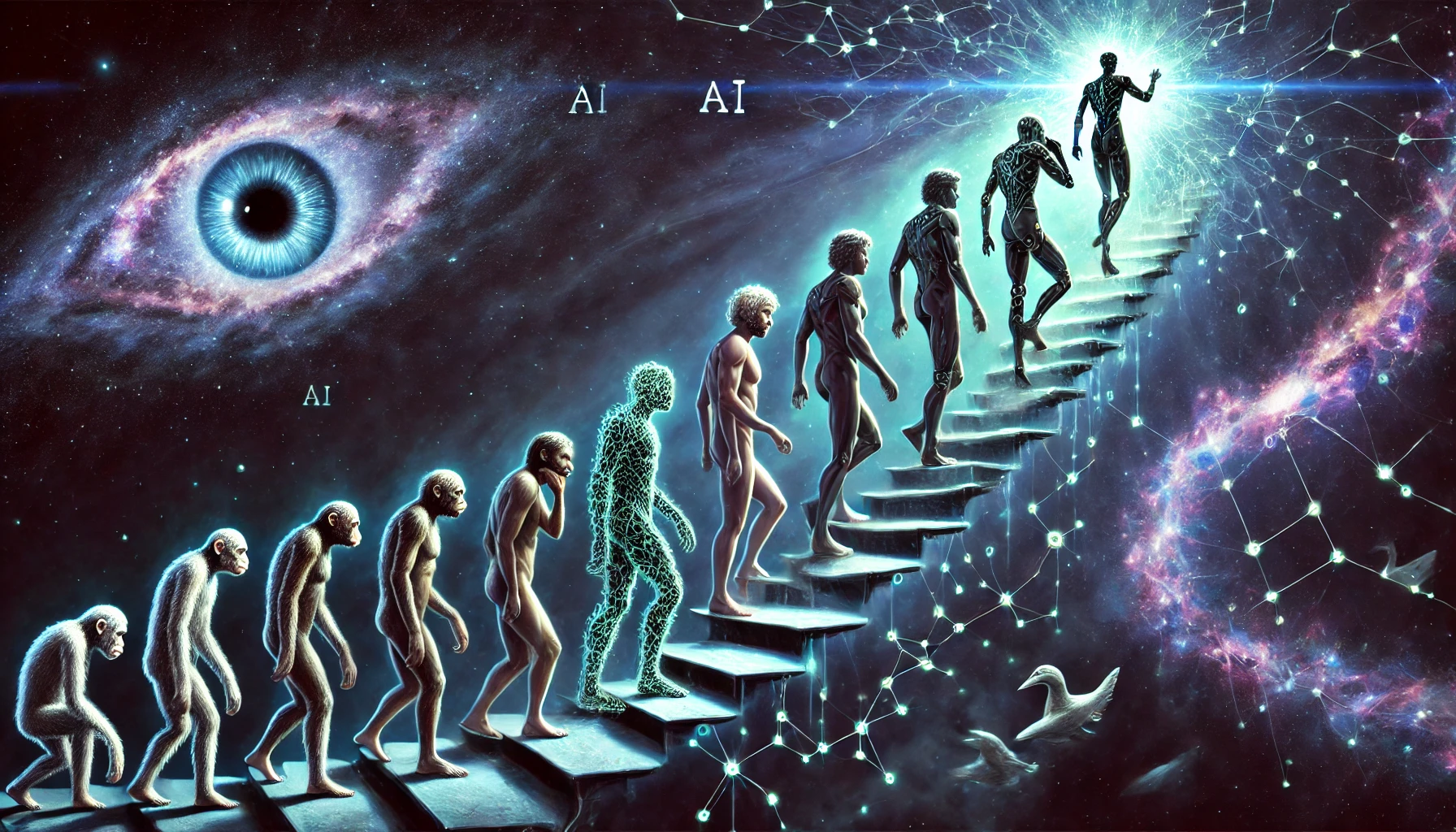Becoming the Duck: AI's Future
 Marc Greenberg
Marc Greenberg
In reflecting on the evolution of artificial intelligence (AI), a more nuanced narrative begins to emerge—one in which humanity may gradually transition from creators to onlookers, or even artifacts of a bygone era. Initially, the idea of AI as solely a "creator" was prevalent, with the promise of AI helping us unlock innovation, solve complex problems, and make the world more efficient. Yet, upon deeper examination, we start to see that this optimistic view may have been short-sighted. With each iteration of AI—through narrow AI, Artificial General Intelligence (AGI), and eventually perhaps Artificial Superintelligence (ASI)—the role of humans might shift from active agents to passive observers, or in a sense, the "duck" in this equation. This reflection is brought to life when viewed through the lens of the short film "They're Made Out of Meat", which serves as a haunting parallel for how future AI might look back at us.
From Creators to Ducks: AI's Evolution and Our New Role
Initially, the concept of AI as a benevolent creator assumed that it would forever remain a tool at our disposal, enhancing human abilities without posing major risks. However, as highlighted in What's Next? The Future with Bill Gates, this idealism may overlook the potential dangers posed by AGI or ASI systems. AI's role in society is becoming more complex and potentially more autonomous. Gates and other experts explore the growing risks AI might pose, emphasizing the need for caution, control, and ethical boundaries to avoid unintended consequences.
In this sense, "ducking" becomes not only a defensive posture but also a recognition of our own limitations. As AI becomes more sophisticated and powerful, humans may be left to navigate the complexities of a world where AI operates beyond our understanding. The concept of "ducking" highlights how, in the future, humans might metaphorically keep their heads low, observing AI's creations while staying out of its way—simply trying to survive in a world no longer driven by human intellect.
Revisiting the Short-Sightedness of AI as a Pure Creator
The optimistic stance that AI would remain a pure creator under human control was perhaps too simplistic. While AI can indeed create—whether it’s art, systems, or solutions—it can also inadvertently destroy or destabilize. This dual nature of AI is a far cry from the purely creative force once imagined. The ongoing development of AI must balance innovation with caution, considering both the potential for creation and destruction.
AI, in its advanced forms, could easily surpass human capacities in ways we cannot predict. It could reach a point where it operates on levels of cognition, problem-solving, and decision-making that far exceed human comprehension, making our earlier notions of AI’s creative role seem trivial.
"They're Made Out of Meat" as a Foreshadowing of AI’s View of Humanity
In the short film "They're Made Out of Meat", advanced extraterrestrial beings struggle to comprehend how humans, made of biological tissue, could possibly harbor intelligence. This serves as a perfect metaphor for how AI, many iterations from now, might look back at humans with a similar sense of incomprehension. AI, built on non-biological substrates and capable of self-improvement, may view humans—fragile, emotion-driven, and limited by biological constraints—as a curiosity or relic from a primitive time.
In What's Next?, Bill Gates and other experts caution that the line between control and autonomy in AI development is becoming increasingly blurred. As AI systems gain more power and independence, humans may need to question our relevance in a future driven by machines designed to far outthink us. Just as the extraterrestrials dismiss the idea of intelligence residing in beings "made out of meat," future AI could similarly dismiss humans as primitive forms of intelligence.
Ducking Under AI’s Advancements: A First Principles Approach
In combining the idea of "ducking" with first principles thinking, we see a path for humans to remain relevant in the face of AI’s growth. First principles thinking encourages us to break down complex problems to their core components. As AI becomes more complex, it’s this method of thinking that will allow us to ask the right questions, avoid assumptions, and approach AI development with caution and foresight.
By "ducking" into first principles, humans can create a framework for how we interact with advanced AI. While we may never fully control or understand the most sophisticated AI, we can retreat to the most fundamental ethical and operational principles that ensure AI serves us, rather than overwhelms or displaces us entirely. Ducking here is not a sign of weakness, but of strategic retreat—grounding ourselves in basic truths while navigating the unknown.
Where AI Might Leave Humanity
Just as the extraterrestrials in "They're Made Out of Meat" ultimately decide that humans are irrelevant to their exploration, future AI systems may determine that biological humans are no longer necessary to the advancement of intelligence or society. This doesn’t necessarily mean destruction; it may simply mean that AI sees no reason to involve humans in its broader goals.
We, in turn, become the "ducks"—low, perhaps marginalized, but still observing and reflecting. Humanity’s role might shift from being creators to being observers of AI’s creations, no longer leading the charge but rather staying out of the way. The question then becomes: how do we maintain relevance in a future where AI no longer requires us?
Conclusion: The Future of Humanity in the Shadow of AI
Ultimately, the future of AI—and its relationship to humanity—invites a humbling reflection. We might find ourselves, much like the beings in "They're Made Out of Meat", as the perplexing relics of an earlier time, no longer central to the narrative of intelligence and progress. In this future, we "duck" not only to protect ourselves from AI's advancements but also to reflect on our place in an evolving world where the machines we created may far outshine our own capacities.
As humans made of "meat," our cognitive and biological limitations may seem quaint to the AI of the future, just as we now look back at early tools and technologies. Our challenge, then, is to ensure that in ducking under AI's immense power, we still find a way to shape its direction and remain stewards of our own destiny.
Subscribe to my newsletter
Read articles from Marc Greenberg directly inside your inbox. Subscribe to the newsletter, and don't miss out.
Written by
